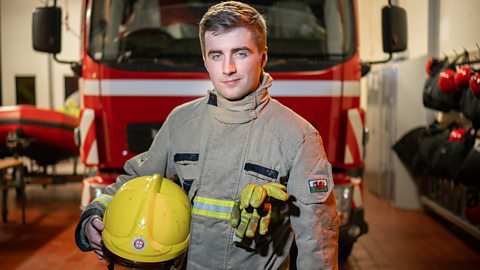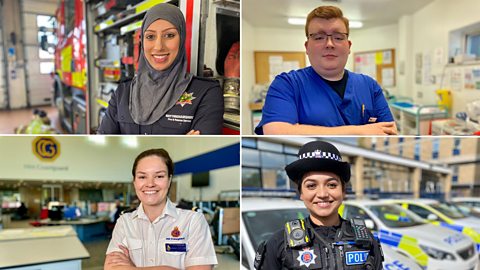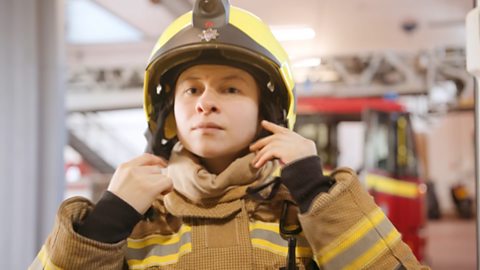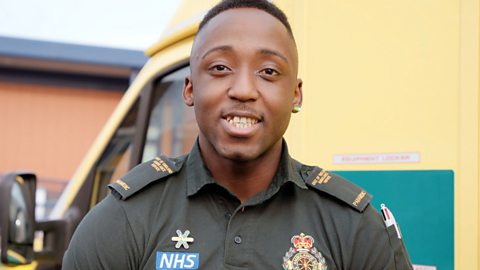Meet Elis, 21, from North Wales. Find out about his life as a part-time, on-call firefighter. Part of our Bitesize world of work series.


How would you describe your job to others?
Some firefighters are employed full-time and it is their main job, whereas IÔÇÖm an on-call firefighter and have a day job too. IÔÇÖm a shop assistant and when IÔÇÖm working I have to be within five minutes of a fire station. I am on call most of the time and I respond from work. We carry pagers, because we can get called to an emergency at any time.
Every day is different. In the shop, I could be serving a customer, having my lunch break, or out on deliveries. The pager could go off at any time. I have to drop my tools and respond.
Every Tuesday we have a training night, where we check our equipment and practise emergency scenarios. We need to make sure that we are ready for any type of emergency.
Was this a job you always knew you wanted to do?
When I was young, I knew I wanted to be a firefighter. We had one living next door to us. Seeing him going out when his pager went off and watching him come past the house with a fire engine with the sirens going, that set me off thinking I wanted to be a firefighter.
What was your educational career path?
I picked my GCSEs knowing I wanted a career in the fire service. I was told it would be good to take Geography and PE, and I got myself eight GCSEs. The Fire Service doesnÔÇÖt always ask for specific qualifications, the important thing is you have the right skills and qualities, but having good grades in English (or Welsh in Wales) and Maths will help you pass the selection tests. I am a fluent Welsh speaker which can help in Wales.
I started the Fire Cadets midway through high school. It was the best thing I did, because I knew what to expect from the job. I learnt things like first aid training and hose running. It helped me get ahead of the game. At college, I did a Level 3 Public Service course. I finished my college course and a week after that I was at training school. I was 18.
What skills do you use at work?
Problem solving ÔÇô once you get to an incident, straight away you have to see what the problem is and find a way to solve it. Teamwork ÔÇô in most situations you work in a team to complete your task. Communication comes in there as you need to be able to communicate effectively. You need to be committed to get the job done. Discipline is also important because itÔÇÖs a uniformed service, so you have to make sure your behaviour is right.


Top tips
Work hard in school, get your grades, and ask what the best educational path for your chosen career is. Make the most of career advisors in school
I had help from Careers Wales, and I spoke to one of the workers in school. They showed me which skills I needed. I asked as many people as I could
The first part of my training was pretty tough ÔÇô thatÔÇÖs where they test your commitment and discipline. You constantly have to work hard in your assessments.

Elis' role in the fire service is slightly different, as he works on a part-time, on-call basis. However, if you are interested in becoming a full-time firefighter, here's what to expect:
What to expect if you want to be a firefighter
- Firefighter average salary: £24,191 to £32,244 per year
- Firefighter typical working hours: 41 to 43 hours per week, including evenings, weekends and bank holidays.
What qualifications do you need to be a firefighter?
You could get into this role via a college course, an apprenticeship, a fire service training course, or by applying directly.
Sources: LMI, National Careers Service
This information is a guide and is constantly changing. Please check the website for the latest information and all the qualifications needed.
For careers advice in all parts of the UK visit: , , and .

Jobs that give back: My frontline career. video
Hear from four young people ÔÇô a firefighter, nurse, police sergeant and coastguard ÔÇô who are helping others via their frontline careers.

Izzy: firefighter. video
Izzy works as a firefighter in London.

Tanoh: paramedic. video
Tanoh's a paramedic in the NHS.
